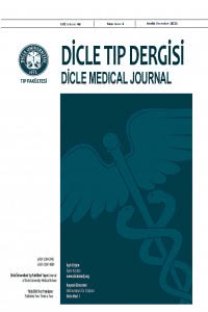The Determinants of Academic Achievement in Medical Students: a Cross-Sectional Designed Multifactorial Approach
The Determinants of Academic Achievement in Medical Students: a Cross-Sectional Designed Multifactorial Approach
___
- 1. Dubuc MM, Aubertin-Leheudre M, Karelis AD. Relationship between Academic Performance with Physical, Psychosocial, Lifestyle, and Sociodemographic Factors in Female Undergraduate Students. Int J Prev Med. 2017; 8: 22.
- 2. World Health Organisation (WHO). Body Mass Index-BMI. https://bit.ly/32xqnDt
- 3. Lee R, Nieman D: Anthropometry: Nutritional Assessment, vol. 119. USA: Brown and Benchmark; 1993.
- 4. Pekcan GŞ, N.; Baş, M.: Türkiye Beslenme Rehberi TÜBER 2015. Ankara: T.C. Sağlık Bakanlığı; 2016.
- 5. Rakıcıoğlu N, Samur G, Başoğlu S: Diyetisyenler İçin Hasta İzlem Rehberi/Ağırlık Yönetimi El Kitabı. Ankara: T.C. Sağlık Bakanlığı Halk Sağlığı Genel Müdürlüğü; 2017.
- 6. Saglam M, Arikan H, Savci S et al. International physical activity questionnaire: reliability and validity of the Turkish version. Percept Mot Skills. 2010; 111: 278-84.
- 7. WHO: Haemoglobin Concentrations for the Diagnosis of Anaemia and Assessment of Severity Geneva: World Health Organization; 2011.
- 8. Baykan Z, Naçar M. Tıp fakültesi öğrencilerinin sigara kullanımı ve tütün kanununa ilişkin görüşleri. Dicle Tıp Dergisi. 2014; 41: 483-90.
- 9. Paul RH, Brickman AM, Cohen RA et al. Cognitive status of young and older cigarette smokers: data from the international brain database. J Clin Neurosci. 2006; 13: 457-65.
- 10. Ferguson E, James D, Madeley L. Factors associated with success in medical school: systematic review of the literature. BMJ (Clinical research ed). 2002; 324: 952-7.
- 11. Haidinger G, Frischenschlager O, Mitterauer L. Reliability of predictors of study success in medicine. Wien Med Wochenschr. 2006; 156: 416- 20.
- 12. Muñoz-García MI, Martínez-González MA, Martín-Moreno JM et al. Sugar-sweetened and artificially-sweetened beverages and changes in cognitive function in the SUN project. Nutritional Neuroscience. 2020; 23: 946-54.
- 13. Bleiweiss-Sande R, Chui K, Wright C, et al. Associations between Food Group Intake, Cognition, and Academic Achievement in Elementary Schoolchildren. Nutrients. 2019; 11: 2722.
- 14. Naveed S, Lakka T, Haapala EA. An Overview on the Associations between Health Behaviors and Brain Health in Children and Adolescents with Special Reference to Diet Quality. International Journal of Environmental Research and Public Health. 2020; 17: 953.
- 15. Loprinzi PD, Edwards MK, Crush E, Ikuta T, Del Arco A. Dose–Response Association Between Physical Activity and Cognitive Function in a National Sample of Older Adults. American Journal of Health Promotion. 2018; 32: 554-60.
- 16. Bernard P, Doré I, Romain AJ, et al. Dose response association of objective physical activity with mental health in a representative national sample of adults: A cross-sectional study. PLoS One. 2018; 13.
- 17. Cappelletti S, Piacentino D, Sani G, Aromatario M. Caffeine: cognitive and physical performance enhancer or psychoactive drug? Curr Neuropharmacol. 2015; 13: 71-88.
- 18. Gilliland K, Andress D. Ad lib caffeine consumption, symptoms of caffeinism, and academic performance. Am J Psychiatry. 1981; 138: 512-4.
- 19. Carson V, Hunter S, Kuzik N, et al. Systematic review of sedentary behaviour and health indicators in school-aged children and youth: an update. Appl Physiol Nutr Metab. 2016; 41: S240-65.
- 20. Haapala EA, Poikkeus AM, Kukkonen-Harjula K, et al. Associations of physical activity and sedentary behavior with academic skills--a follow-up study among primary school children. PLoS One. 2014; 9: e107031.
- 21. Stoltzfus RJ ML, Black RE: Iron deficiency anaemia. In: Comparative quantification of health risks: Global and regional burden of disease attributable to selected major risk factors. Volume 1, edn. Edited by Ezzati M LA, Rodgers A, Murray CJL; 2004: 163-209.
- 22. Shah RC, Wilson RS, Tang Y, et al. Relation of hemoglobin to level of cognitive function in older persons. Neuroepidemiology. 2009; 32: 40-6.
- 23. Schneider ALC, Jonassaint C, Sharrett AR et al. Hemoglobin, Anemia, and Cognitive Function: The Atherosclerosis Risk in Communities Study. The Journals of Gerontology: Series A. 2015; 71: 772-9.
- 24. Rani NA, Arasegowda R, Mukherjee P, Dhananjay SY. Prevalence of Nutritional Deficiency Anaemia and Its Impact on Scholastic Performance among Undergraduate Medical Students. J Clin Diagn Res. 2017; 11: Bc21-bc3.
- 25. Ptomey LT, Steger FL, Schubert MM, et al. Breakfast Intake and Composition Is Associated with Superior Academic Achievement in Elementary Schoolchildren. J Am Coll Nutr. 2016; 35: 326-33.
- 26. Ivanovic D, Vasquez M, Aguayo M, et al. Nutrition and education. III. Educational achievement and food habits of Chilean elementary and high school graduates. Arch Latinoam Nutr. 1992; 42: 9-14.
- 27. Jacka FN, Cherbuin N, Anstey KJ, Sachdev P, Butterworth P. Western diet is associated with a smaller hippocampus: a longitudinal investigation. BMC Med. 2015; 13: 215.
- 28. Benton D. Micro-nutrient supplementation and the intelligence of children. Neurosci Biobehav Rev. 2001; 25: 297-309.
- 29. Perlman AI, Worobey J, O'Sullivan Maillet J, et al. Multivitamin/Mineral supplementation does not affect standardized assessment of academic performance in elementary school children. J Am Diet Assoc. 2010; 110: 1089-93.
- 30. Veena SR, Hegde BG, Ramachandraiah S, et alK. Relationship between adiposity and cognitive performance in 9-10-year-old children in South India. Arch Dis Child. 2014; 99: 126-34.
- ISSN: 1300-2945
- Yayın Aralığı: 4
- Başlangıç: 1963
- Yayıncı: Cahfer GÜLOĞLU
Neonatal Supraventriküler Taşikardi: Tek merkez Deneyiminin 10 Yıllık sonuçları
Dilek DİLLİ, Ayşegül ZENCİROĞLU, Senem ÖZGÜR, Utku Arman ORUN, Seda AYDOĞAN, Hasan AKDUMAN, Başak KAYA GÜRSOY, Rümeysa ÇİTLİ, Nurdan DİNLEN FETTAH, Serpil KAYA ÇELEBİ
Reyhan GÜNDÜZ, Elif AĞAÇAYAK, Senem YAMAN TUNÇ, Mulaim SİZER, Ahmet YALINKAYA, Talip GÜL
İbrahim DEGER, Sabahattin ERTUĞRUL, Sibel TANRIVERDİ YILMAZ, Mehmet TÜRE
Tubal Reanastomoz Sonrası Gebelik Sonuçları: Yeni Bir Teknik
Seyhmus KÜLAHCİOGLU, Murat KARACAM, Nesri DANISMAN, Seref Berk TUNCER, Barkın KÜLTÜRSAY, Ali Furkan TEKATLİ, Ayhan TOSUN, Ravza Betül AKBAS, Ayhan KÜP, Mehmet AYTÜRK, Ender Özgün ÇAKMAK, Abdülkadir USLU
The Association Between Weight Loss and Platelet Markers in Morbidly Obese Patients
Gamze ÖZTÜRK, Müzeyyen ASLANER AK, Sehmus ERTOP
Ozgen Ahmet YİLDİRİM, Kerem POYRAZ, Erkan ERDUR, Canan CAN, Cihan GUNDOGAN, Halis YERLİKAYA, Serdar YİLDİRİM, Yunus GUZEL, Halil KÖMEK
